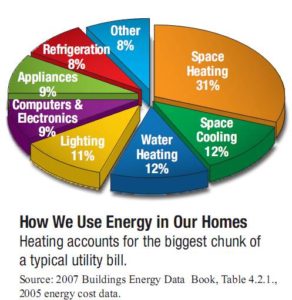 We have shown a number of graphs on previous posts as well as this post about electrical use by household appliances. They all vary to some degree simply because the assumptions are different in every case. This is due to personal requirements, living styles, climate and rates that people pay for electricity.
We have shown a number of graphs on previous posts as well as this post about electrical use by household appliances. They all vary to some degree simply because the assumptions are different in every case. This is due to personal requirements, living styles, climate and rates that people pay for electricity.
What does not seem to change very much are the energy hogs. Or the culprits in terms of which ones use more electricity than others. For example if you own a pool or spa, run your air conditioning a lot, chances are that these appliances will be the big spenders of electricity unless you do something to control them.
The major appliances are the next group were energy use by household appliances are high. Your fridge, washing machine, clothes dryer, freezer, electric ovens, and dishwasher are as a group the big set of offenders. They all have motors of some kind and they all run a lot. The amount of electricity they actually draw depends on many factors peculiar to your personal taste as well as the type of appliance and how energy efficient it is in the first place.
Ways to Reduce Energy Use of Household Appliances
For example we have a freezer which is a big energy hog, but we only run it for a month around Christmas time when there is lots of family coming over and we need to have food available. After the festivities we store some of the left overs in the freezer. This step alone probably saves us $170 a year in electricity cost. While this may not seem like a lot of money to some people, when you add this savings along with other savings you get from upgrading your fridge for example to a more efficient model ($125), changing all of your lights to fluorescent ( $12 / light) and on and on. Pretty soon you have saved yourself over $500 a year in electrical charges which is significant.
There are also special items that not everyone has. We all have for the most part 4 major appliances and some have a 5th i.e. a dishwasher. But what about aquarium pumps, dehumidifiers and microwaves. These devices also use electricity and they can bring much enjoyment to the owners ( aquariums ) , however they come at a cost. An aquarium is estimated to cost around $40 per year to run the lights and the pump. There are many other devices which contribute to power use, however each person must make their own judgement regarding how far they want to go to save money and to save electricity or energy.
Lights – How do they Stack up Against Energy Use of Household Appliances
None of these graphs really focus on lights, yet our parents always told us to shut the lights off when we left a room. Each individual light does not use that much energy by itself, however there are two principles at work year. One is all about habits. That is forming the habit to turn things off when they are not being used. If you turn the lights off as part of a habit that you have formed chances are this will apply to other appliances as well. For example TV’s and computers for example.
The other principle here is that every little device, including lights use electricity. While they do not use much electricity by themselves, they do use a lot as a group when you add them all together. By focusing on this group and turning off all devices when they are not ins use will have the same effect as controlling or managing the use of a large appliance. If you are really motivated because you need to save money or just because you want to do your part to reduce your energy foot print this is another area to focus and reduce electrical use.
Adding lights, TV’s, home computers for example together can save you a hundred dollars or more, which makes it definitely worth while to reduce your costs. Every little bit counts and it is one of the big reasons we urge consumers to focus on the big items first, then take a look at the smaller items such as light bulbs and conserving energy. Over a year even these small items can make a big contribution to reducing our energy consumption.
September 17th, 2012 on 9:41 pm
I am personally very interested in reducing my energy foot print, but my neighbor could not care less. They have lots of money and do not care what they spend and how they use energy. It is just not part of their thought process. How do you deal with people like this?